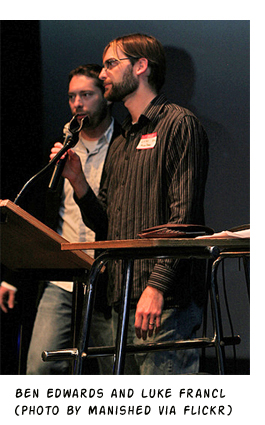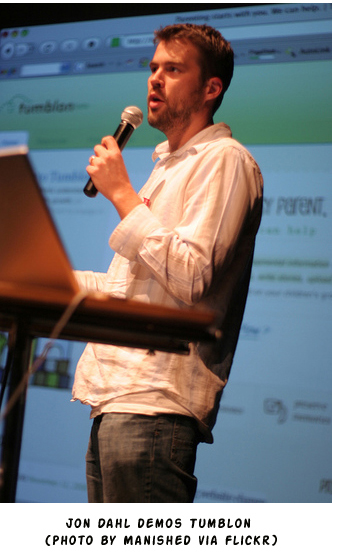
Nearly 300 people attended MinneDemo last Wednesday held in Uptown’s Intermedia Arts which was the best venue in the series of “unconference” demo showcases. Ten Minnesota tech companies presented their products in 7 minute demos to a packed auditorium coordinated by MinneDemo co-founder Luke Francl. After a brief introduction by Luke and MinneDemo co-organizer Ben Edwards, the demos began without the use of Powerpoint or any other presentation software.
The event got off to a fast start with Reactor, the first product from Rochester-based Hardcore Computer. An imposing beast of a computer at over 125 pounds, this is billed as the first personal supercomputer. Aside from being a wicked fast machine tuned for gaming, the first thing you notice is that the entire motherboard is encased in oil to cool the processor and other components. This fluid is highlighted with a blue light that makes a stunning first impression. After the demos were complete we were able to see Reactor put through it’s paces with a racing game which was most impressive. But it was clear from speaking with executives at the event that they have plans to target other processor intensive applications outside the gaming world such as architecture, video rendering and government applications.
The second demo was an interesting new iGoogle and Gmail gadget called Periscope. Developer Ivan Stegic from Ten Seven Interactive showed how Periscope brings the 37 Signals Basecamp application to a user’s iGoogle homepage or even into the sidebar of Gmail. This is the type of productivity application that a designer or advertising agency would develop for themselves to manage multiple projects without having to log into the Basecamp interface. Now in public beta, this free gadget is useful to any Basecamp user and there is also an iPhone version available that was not demonstrated at MinneDemo.
 Next, Jon Dahl introduced the availability of Tumblon, a site designed for young families to share the development of their children with family and friends. Using an intuitive user interface, the site also provides parents with professionally written articles to advise them at each stage of their child’s development. The social networking aspects include photo and video sharing along with a personal blog. Granular permissions give the user the ability to control who has access to their posted content. Tumblon is free and available to all parents right now.
Next, Jon Dahl introduced the availability of Tumblon, a site designed for young families to share the development of their children with family and friends. Using an intuitive user interface, the site also provides parents with professionally written articles to advise them at each stage of their child’s development. The social networking aspects include photo and video sharing along with a personal blog. Granular permissions give the user the ability to control who has access to their posted content. Tumblon is free and available to all parents right now.
The fourth demo was from Sudden Deals, a location based mobile promotional service delivering coupons to mobile phones. After signing up and validating their mobile phone number, the user chooses dining, music events or both and sets the location they will be at and the site matches these with promotional offers. Merchants also use the website to post offers for which they pay a service charge. Sudden Deals now covers the Twin Cities metro area and is free for individuals to use.
Portage Interactive was next to take the stage to show their Team Treks interactive educational game, Glacier Bay. The web-based survival game is intended to promote teamwork for children in 4th thru 6th grade. Teachers are given the ability to set up groups, conditions and change questions in order to meet their learning objectives. Looking at the game during the demo it was clear this is from the same designer who brought teachers Amazon and Oregon Trail games back in the 1980’s and ’90’s.
 Riverock Technologies was next with their OnePlace online team collaboration application. An accomplished and well designed web application, OnePlace gives small work teams a powerful environment to share tasks, files and project status online and on mobile devices including Apple’s iPhone. What was most interesting to see in the context of a groupware application was the use of Twitter-like micro-messaging built right into OnePlace. A 30-day free demo of OnePlace is available and presenter Steve Kickert also mentioned a MinneDemo coupon code for 25% off the first paid month.
Riverock Technologies was next with their OnePlace online team collaboration application. An accomplished and well designed web application, OnePlace gives small work teams a powerful environment to share tasks, files and project status online and on mobile devices including Apple’s iPhone. What was most interesting to see in the context of a groupware application was the use of Twitter-like micro-messaging built right into OnePlace. A 30-day free demo of OnePlace is available and presenter Steve Kickert also mentioned a MinneDemo coupon code for 25% off the first paid month.
The seventh demo was from Zanby, a social networking content management system that is used for sites such as theuptake.org. The system can be used at the Zanby website or deployed on any webserver and customized to meet the needs of the company on the internet or on their intranet. Zanby makes it easy for organizations of any size to build collaborative websites quickly and easily.
Next was a demo of some Flash games from Nate Pacyga from Try Catch games. Presenting from a netbook, Pacyga outlined how Try Catch is targeting these casual games at companies looking to rebrand for promotional campaigns. These games can also be used as applications in social networks such as Facebook making these attractive marketing tools for online promotion.
Another online project management application, Enleiten, was demoed next by Doreen Hartzell. Similar to Riverock’s OnePlace, Enleiten targets small group project management but also provides a free personal edition. The clean and almost Google-like user interface makes Enleiten an easy tool to integrate into your workflow but it also supports the popular GTD methodology. A personal version of Enleiten is available for free and the professional edition for workgoups is $25 a month and includes extended features.
The final demo of the evening was BannerFlow an online client review application for banner ads. Clearly written after setting up one too many custom FTP servers for clients, BannerFlow gives agencies the ability to skin the service with their logo making it a value added service for their clients. The bare-bones feature set gets the job done and is very easy to use for both agencies and clients. BannerFlow is available now for free, $15 and $25 a month depending upon the number of clients needed.
This was my third MinneDemo and the best from a venue and content perspective. Each demo provided attendees with a glimpse of some of the most innovative hardware and software being created here in Minnesota. If this event is any indication, we are looking at a very good 2009 for Minnesota startups. I, for one, am looking forward to the return of MinneDemo next year.
Thanks to MinneDemo organizers Luke Francl and Ben Edwards along with all the sponsors who made this event possible.
Photo credits link: Manished via Flickr